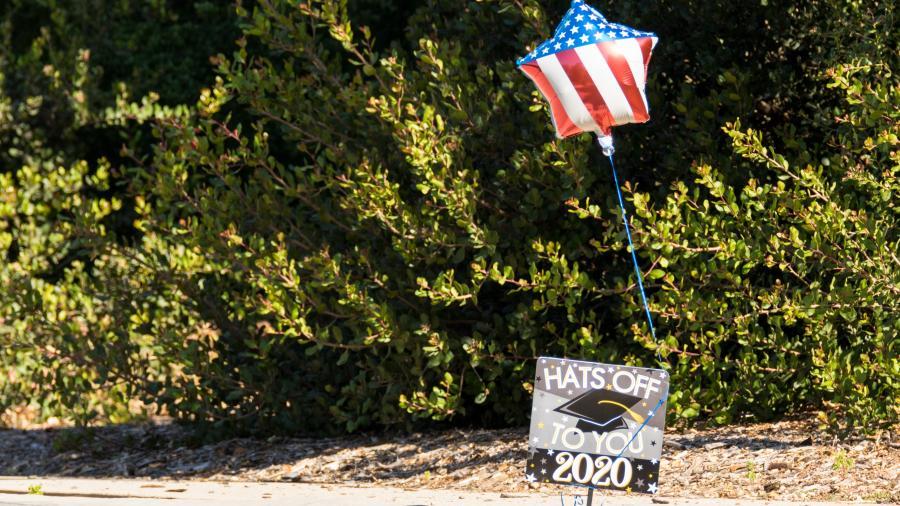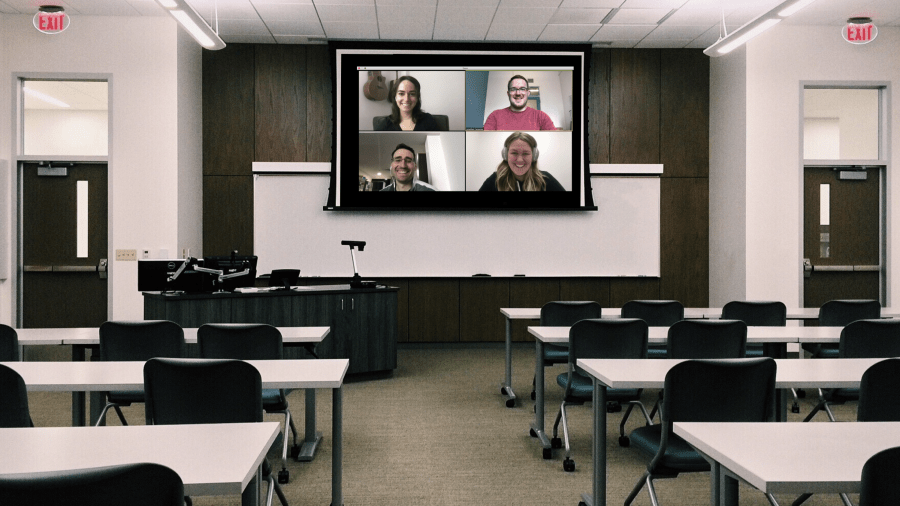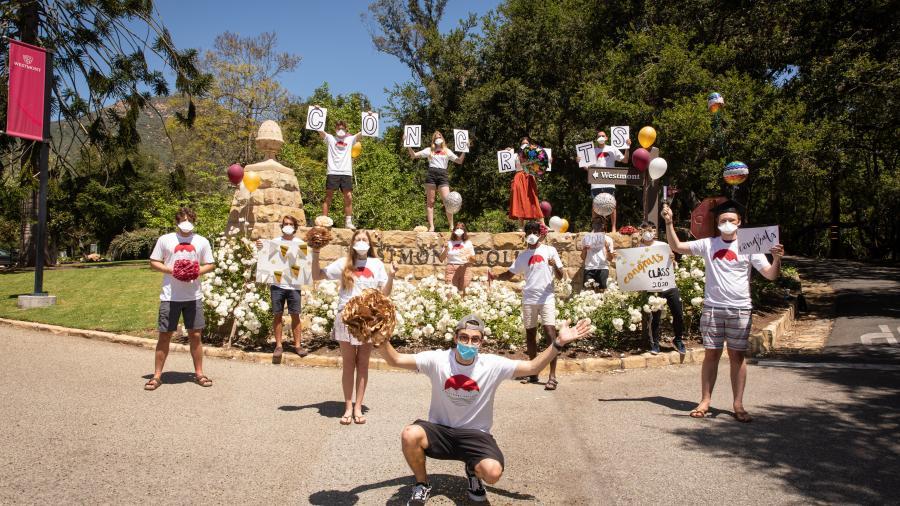Westmont Magazine A Sudden Interruption: Learning in the Time of COVID-19

A Handmade Semester
The last day before spring break—Friday, March 6—Westmont held the annual President’s Breakfast in a packed ballroom at the Hilton Santa Barbara Beachfront Resort with Nobel laureate Daniel Kahneman, who spoke later that morning at Convocation on campus. Students started dispersing that afternoon, some returning home or visiting friends while others served with Potter’s Clay in Ensenada, Mexico, or Urban Initiative in Los Angeles, Salt Lake City, San Francisco, Chicago and Santa Barbara. A few took advantage of great fares to fly to Europe despite warnings about COVID-19.
Many never returned to campus. By March 11, Americans were confronting the threat of the novel coronavirus, unsettled by two jarring announcements: The NBA was canceling its season, and Tom Hanks and his wife, Rita Wilson, had tested positive for COVID-19. Students received an email from the college advising them to expect a decision by noon the next day about the rest of the spring semester.
Students, parents and staff sensed their world was about to change. At noon on March 12, they received the first of many unforeseen announcements: Students should not return to campus because Westmont was switching to remote learning for the next month, until April 13.
“It felt like a shockwave, and it unbalanced us all,” says Caylie Cox ’21, who had traveled to Ensenada, Mexico, with Potter’s Clay. “That evening, I was sitting next to someone I love dearly, and we couldn’t find any words to say. We just held hands. We didn’t want to let go, because we knew we were about to be separated for a long time. That’s the unique grief of college students: We had to leave the place where we lived together and scatter across the country.”
Frenzied activity filled the four days following this news. Professors spent the last half of their break revamping their courses and preparing to conduct them remotely. Few had experience with digital tools such as Zoom, a video conference platform. Some students came to campus, packed for a month, and left for home or a friend’s or relative’s house. International students, those without a place to go and essential student workers received permission to stay on campus—about 120 in all.
Some countries, such as Malaysia, closed their borders, keeping international students from returning home. “Instead of going overseas to visit my old friends and family, I’m spending the summer in Santa Barbara, appreciating the friends and family already near me,” says Kristi Phillips ’23. She had expected to travel to Malaysia for the summer. “As things turned out, I think I’ve grown a lot more than I would have otherwise, and I find myself deeply grateful for simple blessings like food, family near me and a safe place to stay.”
Faculty faced the daunting task of moving some 750 class meetings per week to a completely different format as quickly as possible. Staff dealt with a range of logistical challenges: The IT office provided technical support for remote instruction, the mail center began forwarding packages and Sodexo workers adapted the DC to safely feed students remaining on campus.
Before spring break, the college averaged about five Zoom sessions each week. For the first week of remote education, that number rose to 750. Zoom licenses for instruction and student support increased from 10 to 185. Before the surge into distributed learning, Westmont had 323 active users of Canvas, a learning management platform, with about 17,500 page views. After the change, those totals leaped to 1,326 and 44,000. Meanwhile, internet usage on campus dropped from 407-780 MBs per day to 105 MBs after the exodus of students.
Continuity in the Midst of Chaos
President Gayle D. Beebe explained Westmont’s chief objectives. “Our number-one priority remains the health and welfare of our students, faculty and staff,” he said. “Our second priority is successfully completing the academic semester. Westmont has been tested by fire, flood, multiple evacuations and now the pandemic. In every situation, we’ve shown a discipline and a tenacity that has helped keep us faithful. It will be the same now. My faith in Christ gives me enormous hope for all members of our beloved community and our own destiny as a college. We face our circumstances with confidence that God will give us the courage and creativity to meet each new challenge.”
Remote instruction began on Monday, March 16. Those early days were full of adventure and technological difficulties as professors and students alike learned how to use Zoom, Canvas, YouTube and other technology as educational tools. This new environment created a sense of loss. Professor Michelle Hughes (education) felt the need for human proximity, physical touch and laughter. “Demonstrating passion for content and engaging in dialogue together in the same room is missing, and it stings,” she said. Don Patterson (computer science) said, “While we’re blessed with technology that supports a continuity of information transmission, it’s much harder for that same technology to shape student engagement with knowledge.”
However, professors maintained a healthy sense of humor throughout, enduring the unique challenges of Zoom conversations (“sorry, you go ahead”; “no, you go”; “no, really”) and students who never remembered to mute themselves. Who knew typing could sound that loud? Greg Spencer (communication studies) coined an adjective describing those who felt overwhelmed by all the online learning: “zoomifried.”
In one of his regular updates to faculty, Provost Mark Sargent shared an Amish proverb he learned from Lisa DeBoer (art history). “‘Every quilt needs at least one mistake to prove it was made by hand, by some ordinary person who cared about you.’ Consider some of your glitches as signs that you care. This is a hand-made semester.”
On March 17, President Beebe and his executive team began weekly call-in sessions to provide the latest updates about the semester and answer questions emailed to the college. Recordings of each call were then posted on the COVID-19 web pages, which provide specific information for students, faculty, staff and parents. Hundreds of people joined the sessions each week to hear announcements about classes, events such as Commencement, study-abroad trips, summer programs and plans for the fall. Once the semester ended, the calls became monthly, and the focus changed to plans for the fall.
Governor Newsom’s stay-at-home order for Californians came suddenly March 19 and prompted Westmont, like other colleges and organizations, to adopt new protocols immediately. The college emailed all employees that evening, instructing them to begin working from home the next day and identifying a handful of essential employees who should continue reporting to campus.
The Academic Senate continued to meet and approved a new graphic arts concentration in the art major, which relies strongly on studio courses to root graphic design in traditional artistic practices and principles. The senate also approved a revision of the interdisciplinary ethnic studies minor with a new portfolio of courses. The minor equips students to engage and lead faithfully in the pluralistic environment of the contemporary world and situates issues of race, equity and ethnicity within the context of Christian understandings of human flourishing.
Support for Faculty and Students
Westmont Zoom sessions extended beyond classes and staff meetings. The provost’s office led workshops on a variety of topics, beginning with training on remote education and Zoom and including topics such as Zoom etiquette, advanced functions in Canvas and administering exams remotely. The office also developed a website, Academic Continuity Resources, featuring videos, tutorials and other materials and advice about remote instruction, including tips from fellow faculty.
Support for students continued remotely. Some services, such as Writers’ Corner, already featured online capabilities, but Disability Services moved to a new online platform. The Center for Student Success adapted quickly, with peer coaches using technology such as Google Hangouts to assist students. The coaches also shared personal strategies that helped them study remotely, and they presented a virtual workshop, “College from Home: Tips and Tricks.” Their advice included setting and keeping a schedule and getting dressed for the day. Students also benefited from remote services such as library tutoring and the library research help desk.
Sandra Edgar, peer coaching program coordinator and student success assistant, hosted a workshop for students on Zoom focusing on the best practices for learning at home, discussing time management and other offering practical tips. Sonya Welch, coordinator of academic support services, met with classes or groups of students to share strategies for learning remotely, including organizing their space, setting their schedules and staying engaged.
Dave Hunter (mathematics) met his students in the Discord app, created to provide a free, user-friendly space for video game enthusiasts to connect, chat and play together. When the quarantine began and education moved online, Discord created a short tutorial for professors interested in using their app.
Some students struggled with the transition from classes in person on campus to remote education. To assist those most affected, the college allowed students to request pass/no credit grades in one or more of their classes. President Beebe also announced that all academic scholarship recipients would retain their scholarships next year regardless of their grades for spring semester.
The college protected students’ health through online medical appointments. Although most students had returned home, some stayed in the residence halls, so Dr. Hernandez and the Health Center team faced new challenges, such as caring for students in isolation due to symptoms similar to COVID-19. Thankfully, no students, faculty or staff remaining on campus contracted the virus.
Westmont also provided counseling for students using a telehealth format. “Quarantine is complicated, and there are small things we can do to make it more sustainable,” says Eric Nelson, director of counseling and psychological services (CAPS). He created a video linked to the CAPS website featuring some practical tips—and humor—to help students navigate studying remotely and being quarantined. The site also lists resources such as a Coronavirus Anxiety Toolkit.
The Academic Committee of the Westmont Board of Trustees, led by Rick Fogg ’93, adopted a resolution of appreciation and support for the faculty as they navigated an incredibly challenging season. “It is comforting to know that you, as a body, are there during this time to help our community pursue wisdom in the midst of heightened uncertainty, complexity, and anxiety,” he said. “Please know that the trustees are praying for you and the Westmont community.”
|
Don Patterson in front of Kerrwood Kumquats |
Enrico Manlapig in front of some coveted toilet paper |
Finishing the Semester Remotely
Everyone had begun to adjust to the new situation when the worst news yet arrived: Remote education would extend until the end of the semester. Students who had just left campus had to return to move out, while some could not return at all and had to find other solutions.
“Students who go through challenge and hardship together form a special bond,” President Beebe said. “You’re going through a unique experience together—a significant challenge—and it’s a time to deepen your friendships and your relationships, which will long endure. Despite what life brings, the greatest challenge for us is responding. I encourage you to practice understanding, to give others the benefit of the doubt and to allow each a measure of grace that makes life easier, better and more enjoyable.”
Students studying abroad with the Westmont in Cairo semester returned home and finished their program remotely. “Plans changed from A to B to C to D within the span of four days,” says Hannah Webster ’21. Heather Keaney (history) and her husband, Jim Wright, who led the program, hoped to remain in Egypt but soon realized they needed to leave as soon as possible. “Jim and Heather did an incredible job being honest with us,” says Nate Sirovatka ’21. “I’m grateful they trusted us enough to invite us into the process and notified us of changes as they were happening, sometimes to the point of incredible abruptness.” Nate regrets ending the program early and missing a variety of experiences, but he appreciates the gift of time. “It’s opened up a lot of windows into things I need to work on personally in terms of character development, how I view the world and how I deal with my faith—things that aren’t comfortable but necessary.”
“The viral outbreak is a teaching moment, and all the more so because we are all immersed in its ethical and societal dilemmas,” said Provost Mark Sargent. “Like our students, we’re trying to find our own way through the philosophical terrain. Addressing the current crisis is part of the curricular pivot. The pandemic makes conversations about the common good less abstract; we are now more fiercely challenged to check our own priorities and preferences and to consider a Christ-like response. Our class discussions have to engage fears and anxieties with compassion and still promote deliberation about how our communities must now steward resources, identify risks and promote hope.”
As classes moved online, so did some of Westmont’s events. Trivia Night, major honors presentations, Spring Research Symposium, chapel, Gaede Institute lectures, museum exhibits and Spring Sing all took place virtually. The various academic departments honored their seniors through Zoom. Unfortunately, many beloved spring events, such as the Fringe Festival, athletic contests and concerts, had to be canceled.
In particular, the women’s and men’s basketball teams missed out on the NAIA National Tournaments; the women earned a No. 1 national ranking and the No. 1 seed at the tournament even before the playoff season began, and the men received a No. 7 seed, their highest placement ever. “This group has responded with sadness but also resiliency to say we choose to love each other through this, be there for each other and help process with each other,” said Kirsten Moore, head coach of the women’s team. “We want to look back at what we accomplished and be proud of what we did and not have it feel incomplete. This group accomplished amazing things this season.” (see the sports section for more athletic news) The baseball, tennis and track and field seasons ended after only a few weeks of competition.
The college canceled all the concerts for the rest of the semester as well as summer tours by the choir and orchestra, but musicians kept playing despite social distancing. Members of Westmont’s College Choir, Orchestra and Choral Union sent in videos of themselves singing or playing one of the songs they would have performed in their spring concerts. John Butler ’20 edited these contributions together to create three YouTube videos: the College Choir performing Aaron Copland’s “The Promise of Living,” the orchestra playing Copland’s “Simple Gifts: Variations on a Shaker Melody” and Dan Goeller’s “Appalachain Carol” and Choral Union giving a benediction to the community through Peter Lutkin’s setting of “The Lord Bless You and Keep You.” All three performances appear on the Westmont Music Department website. Three alumni even joined in the music-making, creating a socially distanced version of “It Is Well with My Soul.”
Instead of exhibiting their senior show, “Adjacent,” in the Westmont Ridley-Tree Museum of Art as usual, art majors from the class of 2020 hope to share their work during the rescheduled Commencement weekend. Some of the pieces require installation, which makes an online exhibit challenging, but several artists have posted their projects on their personal social media and websites. The museum’s annual juried show moved online and featured 48 works by artists from Ventura, Santa Barbara and San Luis Obispo counties. Christopher Miles, professor at the School of Art at CSU Long Beach, juried the show, “Time and Memory,” which received 221 entries from 95 artists.
With reduced activity of humans on campus, Amanda Sparkman (biology) collected observations of other species. She recruited individuals on solitary walks or families taking strolls to record some sights and sounds. She reported a sighting of a California mole eating breakfast, as well as a surprising appearance of a western gray squirrel. While eastern fox squirrels and California ground squirrels are common on campus, the western gray squirrel has largely disappeared from many parts of California.
Becoming the Hands and Feet of Jesus
In response to a plea for masks, Westmont donated 1,000 N95 masks to Cottage Hospital in Santa Barbara. “We want to do everything we can to help Cottage’s dedicated health care workers and their support staff get the protection they need,” President Beebe said. The college reserved a supply of N95 masks for students, faculty and staff who remained on campus. Students also volunteered with other Westmont community members at a food drive for the Foodbank of Santa Barbara County. The effort collected more than 2,000 pounds of food and $2,370 in cash donations.
“We need to be vigilant, no longer thinking of ourselves but learning to live with the spirit of Christ in thinking of our neighbor,” President Beebe said. “We need to learn to be the hands and feet of Jesus.”
Westmont launched the COVID-19 Emergency Relief Fund March 31 to meet the unexpected expenses of moving to remote education and manage the unprecedented disruption. An anonymous donor agreed to match all gifts up to $50,000. As of early June, generous supporters had given $202,203 for a total of $252,203.
On April 2, Steve Bell, a Christian singer and songwriter from Canada, offered a special virtual concert to encourage the Westmont community. He has developed a relationship with people at the college after performing in chapel and at a number of college events.
At an Academic Senate meeting, Carmel Saad (psychology) gave a memorable devotional, “Love in the Time of Social Distancing.” She noted that what may be good biologically (i.e., separation) can be tough psychologically. She encouraged professors to discern some psychological good, such as greater compassion, resilience, humility and time to focus on spiritual pursuits. For one of her scriptural texts, she chose a passage from Romans that conveyed the Apostle Paul’s feelings about being remote from others. “For I long to see you, that I may impart to you some spiritual gift to strengthen you—that is, that we may be mutually encouraged by each other’s faith, both yours and mine.”
Puzzles, Vanilla Chai Lattes and Gardening
After the initial flurry of activity, things slowed down as the weeks progressed. Students sat at home, wondering what to do with themselves when they weren’t studying. Simon Janzen ’21 enjoyed the flexibility of online classes but the lack of social interaction and activities made it hard for him to feel motivated. “I have been wrestling with balancing being sad for missing so many activities and people…with using this as a learning opportunity and a time for growing in trusting God amidst uncertainty,” he says. “I always try to live in the moment…and it’s been very challenging to dwell in and dig into this place because it seems like there’s nothing to do.”
Despite being familiar with remote education as a homeschooled student, Kaylee Hicks ’20 struggled to stay motivated because being home usually means she’s on vacation. Her classes and classmates encouraged her, especially an email chain from her Rhetoric II class. She also found solace in gardening. “Watching new life in this season when things feel desperate—it feels hopeful to do that,” she says.
Katherine Hill ’22 credits vanilla chai lattes with sustaining her, along with her family and her animals. She also admits to a lack of motivation. “This time is really showing me who my friends are because we make an effort to stay in touch with one another,” she says.
Phoebe Wicks ’21 felt challenged by remote education, actively learning and being pushed by her professors, which pleasantly surprised her. She has worked on realizing that life is never “normal” and changing her mindset from “This is a time of waiting” to “This is a season I can learn and grow in.” Meanwhile, her little brother Noah taught her how to do handstands.
Abi Bradshaw ’23 appreciated the flexibility of this new way of learning but had a hard time focusing at home. Fortunately, she found joy in doing puzzles every day.
Hailey Hoang ’21 found refuge at her roommate’s house because she couldn’t fly home to Hawaii after turning in her passport card to get the book for the choir tour to Scandinavia, which was canceled. To pass the time, she’s been playing Animal Crossing, composing and playing music. While it’s been scary to be away from her family, she has stayed connected with them—and with her friends—online.
Postponing—Not Canceling—Commencement
California’s stay-at-home order and prohibition of large public events forced Westmont to postpone Commencement, originally scheduled for May 2. Disappointed parents, families and friends had to cancel or reschedule flights and hotel reservations. With so much uncertainty about large gatherings such as concerts and professional sports, Westmont tentatively announced October 17 as the new date for Commencement, with Baccalaureate October 16. A revamped Homecoming 2020 will also take place that weekend. As planning proceeds, details about both celebrations will be posted on Westmont’s website.
“We hope to celebrate Commencement in a way that brings honor and appropriate celebration to the class of 2020,” says President Beebe. “We dedicate this issue of the Westmont magazine to our seniors and include a special section recognizing their accomplishments.”
The college celebrated the class of 2020 and their graduation on May 2 with a virtual concert featuring two popular Christian recording artists, Phil Wickham and Grammy award-winner Lecrae. The event honored all Westmont students—both current and incoming Warriors. Tributes to the class acknowledged the challenges these students endured, including numerous evacuations due to the Thomas Fire and destructive Montecito debris flow as well as the disruption of a pandemic.
Some graduating seniors enjoyed personal celebrations. Friends, teachers, track coaches and first responders honored Dana Hjelm, a track athlete and biology major, with a drive-by parade in her Lompoc neighborhood. CHP officers and Santa Barbara County Sheriff Bill Brown led about 35 cars down her street. KEYT, the television station in Santa Barbara, reported, “A Westmont College athlete from Lompoc didn’t let having an autism spectrum disorder (ASD) stop her from graduating.” Dana told KEYT she hopes to work for the Santa Barbara County crime lab and “help the health department teach people with special needs about the importance of good nutrition.”
As the semester drew to a close, professors began to reflect on how the crisis has affected their faith. Helen Rhee (religious studies) said, “One question I ask is what kind of God are we experiencing in the context of COVID-19 pandemic? Is it an impassable God who does not suffer? Or a passible God who is suffering with the world? God suffers through Jesus Christ, the second person of Trinity, and we all need a God who suffers, because God’s willingness to suffer with and for creation enables us to make our own suffering meaningful.” Michael Shasberger (music) says, “While we may all be isolated more than ever in our lives, there is no prohibition on love and no contagion carried by reaching out to each other in love through all acceptable means of technology.”
When the spring semester concluded, about 20 professors launched into their Mayterm courses. After the decision to move to remote learning, enrollment in the program rapidly increased to 287, 100 more than last year. Realizing that many high school seniors had extra time, the college offered two remote sessions to incoming students: Philosophical Perspectives taught by Jim Taylor and Political Theories with Jesse Covington. Both courses drew a good numbers of students.
Planning for an Unpredictable Semester
In May, faculty and staff began planning to bring students back to campus for classes in the fall. Numerous committees are creating detailed plans and scenarios to keep students, professors and staff members safe in all areas of college life: the classroom, residence halls, the Dining Commons, athletics, the arts and a range of student activities. Learning in the time of COVID-19 will look different from traditional education, with people wearing masks, practicing social distancing, doing frequent cleaning and following protocols designed to prevent the spread of the coronavirus. College staff members must reimagine life on campus and answer a wide range of questions. The number of returning and new students registering for the fall is the most in a decade, and we’re planning for a full fall. Look for updates about the fall on Westmont’s website.
President Beebe praised the community at the end of the semester. “It’s been amazing to see how well you’ve done on every front: students, faculty, staff and administration. Everyone has pulled together. I firmly believe that who we are at the core of our being comes out in testings and trials like this, and I’m grateful to see the heart of Westmont show up in so many beautiful ways. We can either look at our circumstances and regret them, or we can look at our circumstances and accept them and make the most of them. At our heart, that’s who we are at Westmont. ”



